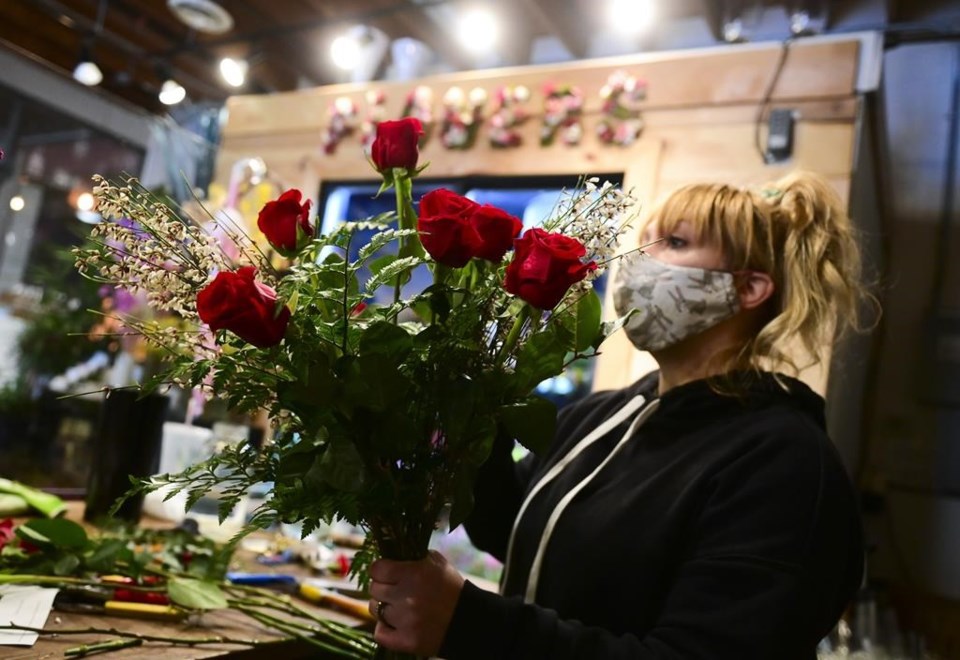TORONTO — Ontario residents looking to buy Valentine's Day flowers for their sweethearts may have to branch out from the classic rose bouquet, or consider celebrating on another day, as the COVID-19 pandemic affects floral supply chains, some in the industry say.
The health crisis caused many local and international farms to cut flower production or shut down altogether last year, and while operations have largely resumed, supply is still lagging, according to some in the industry.
Other factors, such as transportation, are also contributing to the shortage, they say, with a drop in commercial flights and truck shipments that are typically used to haul flowers from South America to Canada via Miami.
Demand for flowers has been high throughout the pandemic, however, likely spurred by people's desire to show affection despite social distancing and to brighten up homes during lockdowns, said Glenn Hofland, owner of the flower wholesaler Hofland, which supplies florists across the country.
It's particularly high for Valentine's Day, and while most people should be able to secure flowers for their loved ones, they might not get their hands on roses, he said.
"It is an overall shortage but the demand right now is so high for roses, that's where we really feel it right now," he said.
When Valentine's Day falls on a weekend, there typically tends to be less of a rush to buy flowers because people have other options to mark the occasion, such as going out for dinner, Hofland said. Not so this year, he said.
"With the current COVID world, that kind of changes because people can't go out, they can't go for dinner, they can't go for a weekend (away)," he said.
"So it's kind of escalating ... and we are feeling that."
Several Ontario florists have urged customers to plan ahead and keep an open mind in placing their Valentine's Day orders, with some suggesting a shift to Valentine's week to ease the pressure on a single day.
Jennifer Fowlow, owner of the Wild North flower shop in Toronto, said the store was sold out for orders on Feb. 13 and Feb. 14 more than a week before Sunday's holiday, and was close to it for Feb. 12.
That's partly because Fowlow cut back on the number of orders the store would accept, given the hurdles posed by the pandemic, and partly because customers are buying more in advance than usual, she said.
"It's a combination of people have less going on -- they're at home, they're thinking about it -- but also of course the supply chain is really quite compromised," she said.
Even shops like hers, which rely heavily on local growers, have experienced difficulties in getting supplies, since other florists have now also turned to local sources, Fowlow said.
Public health restrictions on gatherings also mean it can't be "all hands on deck" on Valentine's Day like it normally would, and staff have been split into several shifts to limit exposure, she said.
Another Toronto florist, Sweetpea's Floral Studio, announced in late January that it wouldn't ramp up operations for Valentine's Day like in previous years, given the strain caused by COVID-19.
"This past year has been more than anyone could have normally handled and, quite frankly, I am worried about the mental and emotional health of my team. I don't want them to burn out over a single holiday," the shop said on social media.
"We would rather set reasonable expectations for ourselves, maintain our quality of service, as well as our own well-being."
The florist said it "highly" encourages customers to order for another day instead.
"We are all in lockdown anyway. Half of us don't know what day of the week it is most of the time. Make Valentine's the day of your own choosing," it said.
Mary Currie, who owns The Monarch Florists in Mississauga, Ont., said the shop has been getting more Valentine's Day orders than usual this year -- and people are opting for more lavish arrangements.
Currie said her regular customers trust her vision, and that's allowed her to make use of what's available during the pandemic. Snapdragons, for example, were plentiful at a time when other blooms were hard to obtain, prompting Currie to start featuring them in her work, she said.
"If you're flexible, there's lots of flowers," even leading up to Valentine's Day, she said.
Large grocery chains, meanwhile, said they didn't expect any issues meeting demand for flowers ahead of the holiday.
"While there has been increased demand and other pandemic related pressures on farms in the lead-up to Valentine's Day, we're expecting to receive deliveries of roses in time for the holiday," a spokesperson for Loblaw said in a statement.
Stores in the Metro grocery chain were also expected to carry roses for the holiday.
"We have secured our requirements based on our anticipated demand, so no shortage expected in our stores," the company said.
This report by The Canadian Press was first published Feb. 10, 2021.
Paola Loriggio, The Canadian Press

